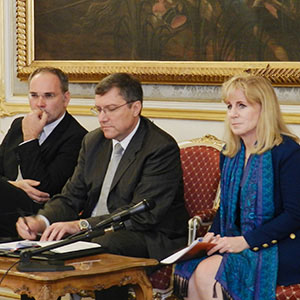
On 8 October 2013, the Vienna Center for Disarmament and Non-Proliferation (VCDNP), the United Nations Office for Disarmament Affairs in Vienna (UNODA), and the Permanent Mission of Hungary co-organized a seminar titled "Chemical, Biological, Radiological, and Nuclear (CBRN) Threats and Responses." This workshop was the second in a series on "Developing a Comprehensive Security Culture."

The event organizers opened the seminar by underlining the importance of discussing all CBRN threats and responses—not just those limited to nuclear weapons—in a comprehensive manner. United Nations Security Council Resolution 1540 was particularly mentioned as a framework that provides such a comprehensive approach, allowing all CBRN threats to be addressed together.
The first panel of the seminar, moderated by Mr. Franz Kolar, UNODA, focused on CBRN threats and the concepts of security culture and ethics. Dr. Amy Smithson, senior fellow, James Martin Center for Nonproliferation Studies, provided an overview of the nature of the chemical and biological threat. Using real-world examples of chemical and biological weapons programs, she discussed some of the challenges to controlling their proliferation, emphasizing the difficulties of balancing peaceful innovation in chemical and biological technology with controlling dual-use items that could be used for weapons. In particular, she pointed out the technical challenges presented by microprocess technologies that would be more difficult to track down than previous technologies, and which she argued should be controlled.
Dr. Johannes Rath, University of Vienna, spoke about the role of ethics in a culture of CBRN security. He argued that CBRN security is not simply a part of national, military, and civil security, but also a part of international and human security. He contended that applied ethics can provide a framework for governance, and discussed examples where ethics could be utilized to guide action in CBRN security—for example, in deciding whether to publish information that could have dual uses. He asserted that although nuclear security culture and biological security culture have many fundamental differences, work should nonetheless be continued toward a comprehensive agreement.

The second panel, moderated by Elena Sokova, VCDNP executive director, focused on the response to CBRN threats. Mr. Muhammad Khaliq, Office of Nuclear Security, International Atomic Energy Agency, spoke about the nexus between nuclear safety and security. According to Mr. Khaliq, safety and security culture can work together because they both have the ultimate goal of protecting the public and the environment; security, however, involves purposeful, malicious acts. A strong security culture requires not only effective management systems, Mr. Khaliq argued, but also an engaged cadre of personnel who believe that the threat exists and that, consequently, nuclear security is essential.
Dr. Smithson spoke again on the second panel, this time examining the role of sciences and responsibility in security culture. She began by describing the environment in which most scientists work, where there is very little concept of insider threat, and information sharing is key. According to Dr. Smithson, in many cases where scientists end up working in weapons of mass destruction programs, they had no intention to do so, and did not know either the ultimate purpose or the illegality of their work. Dr. Smithson concluded that the best way to improve the responsibility of scientists in their work is to develop either educational or enforceable codes of conduct, and to make education in ethics, safety, and security mandatory in university science programs.

Dr. Roger Howsley, executive director of the World Institute for Nuclear Security (WINS), gave an overview of the work of his organization, and specifically discussed the upcoming WINS Academy, due to be launched in 2014. WINS, which was created to work with industry to promote strong nuclear security culture and best practices, believes that security is not only the responsibility of the security specialists and armed guards, but also the nuclear corporations' board, CEOs, and responsible authorized personnel. The WINS Academy, once launched, will help to develop standards and certification for nuclear security specialists, through active courses using course materials developed by WINS, and requiring exams to demonstrate mastery of the subject matter.
Lastly, Dr. Paul Walker, international program director, Environmental Security and Sustainability Program, Global Green USA, discussed the role of civil society in chemical and nuclear security. In addition to other environmental work, Green Cross International (of which Global Green USA is a member) is involved in the dismantlement of Soviet legacy weapons. Dr. Walker shared some experiences with dismantlement, including a lesson learned: for sound demilitarization, there must be transparency and dialogue both internationally, nationally, regionally, and locally. He pointed to the Chemical Weapons Convention as a model for CBRN control, given its inclusivity and non-discriminatory nature. He also noted civil society's active role in the CWC review process, including participation in CWC Review Conferences.
For links to full presentations, please see the event summary page on the site of the Permanent Mission of Hungary to the UN in Vienna, which is also linked from the UN Office for Disarmament Affairs site.